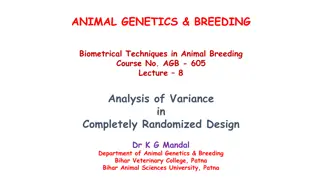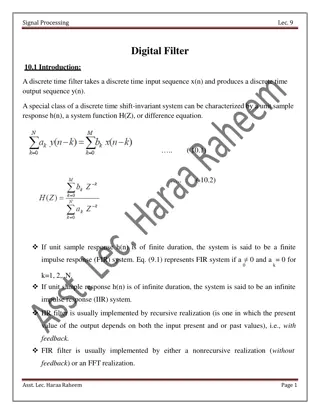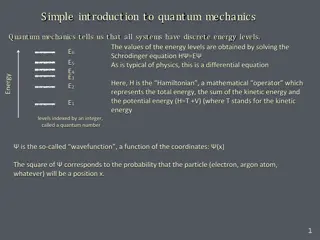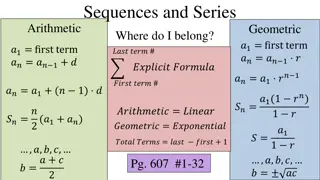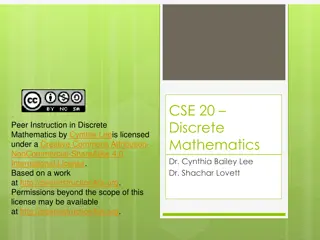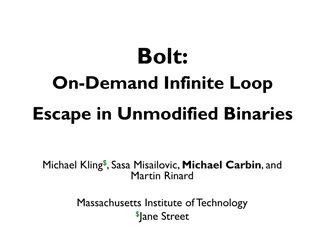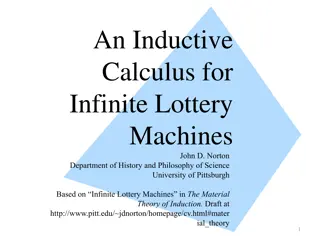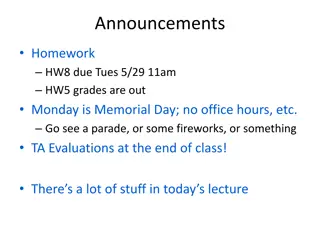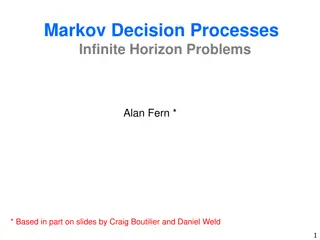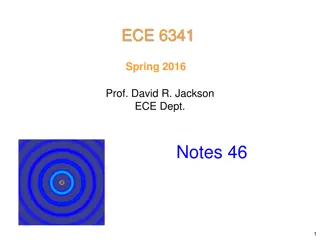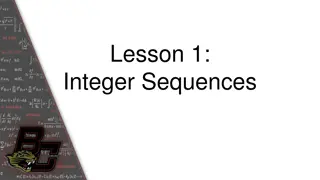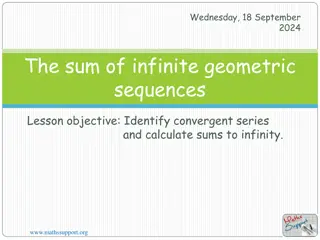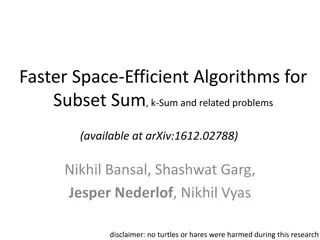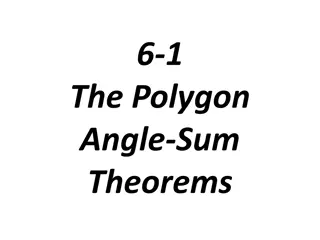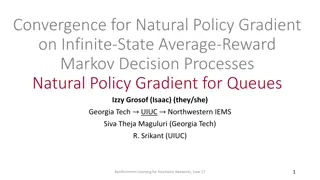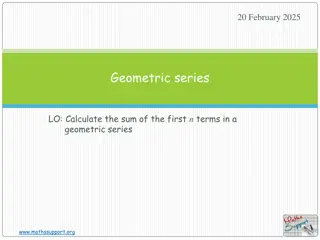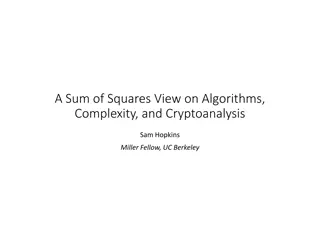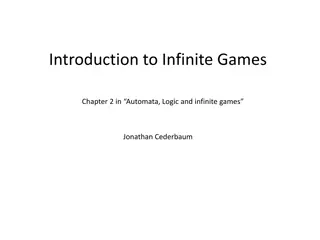Infinite Impulse Response Filters
This lecture discusses the design and implementation of Infinite Impulse Response (IIR) filters using biquad structures. It covers topics such as stability, bounded-input bounded-output equalization, filter design, and filter implementation. The lecture also includes demos on filter design and concl
24 views • 29 slides
SUD Life Century Gold - Individual Saving Life Insurance Plan
SUD Life Century Gold is a Non-Linked, Non-Participating Individual Savings Life Insurance Plan offering flexibility in policy and premium paying terms. It provides two plan options - Goal Sure and Edu Sure, with guaranteed additions and tax benefits under Section 80C and Section 10(10D) of The Inco
9 views • 13 slides
Biometrical Techniques in Animal Breeding: Analysis of Variance in Completely Randomized Design
Biometrical techniques in animal breeding involve the use of analysis of variance (ANOVA) to partition total variance into different components attributable to various factors. In completely randomized designs, experimental units are randomly assigned to treatments, ensuring homogeneity. The total n
6 views • 34 slides
Introduction to Digital Filter Design in Signal Processing
Discrete time filters play a crucial role in signal processing, with finite impulse response (FIR) and infinite impulse response (IIR) systems being two key types. FIR filters have finite duration unit sample responses, while IIR filters have infinite duration responses. FIR filters are implemented
2 views • 12 slides
Introduction to Quantum Mechanics: Energy Levels and Schrödinger Equation
Quantum mechanics reveals that all systems possess discrete energy levels, determined by solving the Schrödinger equation where the Hamiltonian operator represents total energy. In a particle-in-a-box scenario, potential energy is infinite outside the box. The Schrödinger equation simplifies to a
16 views • 12 slides
Detecting and Escaping Infinite Loops with Jolt
In the research conducted by Michael Carbin, Sasa Misailovic, Michael Kling, and Martin Rinard at the Massachusetts Institute of Technology, a solution for detecting and escaping infinite loops using Jolt was proposed. This innovative approach aims to automatically recognize and exit infinite loops,
4 views • 39 slides
Sequences and Series in Mathematics
Delve into the world of sequences and series, understanding the concepts of arithmetic and geometric progressions. Learn to identify finite and infinite sequences, explore various patterns, and model them mathematically. From arithmetic to geometric, finite to infinite, this content offers a compreh
0 views • 52 slides
Solving Maximum Contiguous Subarray Sum Problem with Dynamic Programming
Explore the concept of finding the maximum contiguous subarray sum using dynamic programming as an improvement over divide and conquer algorithms. Learn the steps of defining the objective, writing recurrences, designing memoization structures, and implementing iterative algorithms. Delve into the d
7 views • 32 slides
Set Theory: Infinite Sets and Functions
Delve into the world of discrete mathematics with a focus on set theory, particularly exploring infinite sets and functions. Learn about the concepts of countably infinite and uncountable sets, set equality based on bijective functions, and the properties of injective and surjective functions. Engag
4 views • 22 slides
Escaping Infinite Loops with Bolt: On-Demand Modification for Unresponsive Binaries
Explore how the tool Bolt allows users to escape infinite loops in unresponsive applications by dynamically instrumenting binaries, detecting loop iterations, and offering strategies for bypassing the loop without losing work. Key properties include no special compilation and minimal overhead when a
18 views • 35 slides
Infinite Lottery Machines: An Inductive Approach
An in-depth exploration of the Material Theory of Induction applied to infinite lottery machines, discussing the challenges and strategies for making inductive inferences in such scenarios. The analysis covers probabilistic considerations, countable additivity issues, equal probability of outcomes,
3 views • 22 slides
Sizes of Infinite Sets: Insights into Countably Infinite Concepts
Explore the fascinating world of countably infinite sets through informative images and explanations from a CSE 105 lecture on the Theory of Computability. Delve into the concepts of natural numbers, strings, Turing machines, languages, and the intriguing implications of the Pigeonhole Principle. Di
3 views • 26 slides
Infinite Horizon Markov Decision Processes
In the realm of Markov Decision Processes (MDPs), tackling infinite horizon problems involves defining value functions, introducing discount factors, and guaranteeing the existence of optimal policies. Computational challenges like policy evaluation and optimization are addressed through algorithms
6 views • 39 slides
Streamlining MAPS Claiming Process in Infinite Campus
Streamline the MAPS claiming process in Infinite Campus by accessing reports, selecting federal programs, generating and saving reports, and inputting information correctly. Avoid common errors and warnings to ensure accurate claims submission.
3 views • 14 slides
The Array Scanning Method in Electromagnetics
Exploring the Array Scanning Method (ASM) for analyzing the field of a single source near an infinite periodic structure. The notes cover the geometry, analysis, phasing, and field calculations involved in an infinite 2D periodic array of metal patches excited by dipole sources, providing insights i
4 views • 25 slides
Operational Amplifiers (Op-Amps) and Their Applications
Operational Amplifiers (Op-Amps) are devices used to amplify signals using an external power source. They are composed of transistors, resistors, and capacitors. Op-Amps find applications in summing amplifiers, AC and DC signal processing, digital-to-analog converters, active filters, oscillators, r
3 views • 41 slides
Integer Sequences and Terms
Explore the concepts of integer sequences, including infinite and finite sequences, terms of a sequence, and nth term formulas. Learn to classify sequences as finite or infinite and find specific terms in a sequence. Gain a comprehensive understanding of notation and terminology used for describing
6 views • 23 slides
Modification of Nucleon Spectral Function in Nuclear Medium from QCD Sum Rules
Investigating the modification of nucleon properties in the nuclear medium using QCD sum rules, focusing on hadron properties, mass spectrum, and chiral symmetry restoration. The study discusses the mass differences, non-perturbative contributions, and the analysis of QCD sum rule in nuclear matter.
0 views • 27 slides
Infinite Geometric Sequences and Convergent Series
Explore the concept of infinite geometric sequences in mathematics through the example of cutting a string into halves. Learn how to identify convergent series and calculate sums to infinity, distinguishing between convergent and divergent series based on the common ratio. Delve into the formula for
3 views • 12 slides
Faster Space-Efficient Algorithms for Subset Sum
This research discusses faster and space-efficient algorithms for Subset Sum and related problems, introducing techniques like Meet-in-the-Middle (MitM) approach and Monte Carlo algorithm. It also covers topics such as Floyds Cycle Finding, Element Distinctness (ED) by BCM, List Disjointness, and Su
0 views • 25 slides
Polygon Angle-Sum Theorems
Explore the Polygon Angle-Sum Theorems that determine the sum of interior angle measures in polygons. Learn about the Polygon Angle-Sum Theorem, number of sides in polygons, finding angle sums, and the corollary for regular polygons. Practice using the theorems to calculate interior angle measures i
5 views • 18 slides
Reinforcement Learning for Queueing Systems
Natural Policy Gradient is explored as an algorithm for optimizing Markov Decision Processes in queueing systems with unknown parameters. The challenges of unknown system dynamics and policy optimization are addressed through reinforcement learning techniques such as Actor-critic and Trust Region Po
3 views • 20 slides
Geometric series
A geometric series involves the sum of successive terms in a geometric sequence. By understanding the formula and principles behind geometric series, you can efficiently calculate the sum of the first n terms. Explore examples and formulas to find solutions for different series, whether the common r
3 views • 15 slides
A Sum of Squares View on Algorithms, Complexity, and Cryptoanalysis
This content delves into the Sum of Squares approach, offering a unique perspective on algorithms, complexity theory, and cryptoanalysis. It explores the practical applications, success stories, lower bound achievements, and its role in cryptography. Discover how Sum of Squares provides a powerful f
2 views • 39 slides
Navigating Uncertain Times with Biblical Wisdom
Embrace the wisdom of James 4:13-15 to navigate uncertainty. Learn the dangers of presumption, the importance of planning with God in mind, and the infinite nature of God. Understand the value of planning over presumption, recognizing life's uncertainties, brevity, and aligning with God's will. Disc
3 views • 6 slides
Triangle Angle-Sum Theorem & Exterior Angles
The classification of triangles based on angles and sides, discover the Triangle Angle-Sum Theorem where the sum of angles in a triangle is 180 degrees, and understand the concept of exterior angles in triangles. Learn how to find missing angle values and classify triangles by angles and sides using
8 views • 10 slides
Introduction to Infinite Games and Winning Strategies
Explore the concept of infinite games, players, game boards as directed graphs, winning strategies, forgetful and memoryless strategies, and fundamental results in automata and logic.
5 views • 58 slides
Prime Constellations and Number Theory Insights
Explore the fascinating world of prime numbers, prime counting functions, and prime k-tuples. Learn about admissible k-tuples, constellations with k primes, and the conjecture on infinite twin primes. Delve into numerical evidence supporting the existence of infinite primes within admissible k-tuple
5 views • 15 slides
Efficient Subset Sum and Related Problems Overview
Explore faster and space-efficient algorithms for subset sum and k-sum problems presented in the research paper arXiv:1612.02788 by Nikhil Bansal, Shashwat Garg, Jesper Nederlof, Nikhil Vyas. Discover various strategies and results for solving subset sum instances with different time and space compl
2 views • 27 slides
Infinite Geometric Series
Students will be able to find the sums of infinite geometric series with ratios having an absolute value of less than one. Learn how to determine whether an infinite geometric series has a sum based on the common ratio criterion. Explore examples to calculate the sum of infinite geometric series and
1 views • 6 slides
Infinite Geometric Series and Sigma Notation
Discover how to find the sum of infinite geometric series and represent series using sigma notation in mathematics. Explore examples and solutions for various series.
2 views • 21 slides
Efficient Algorithms Subset Sum
Investigating faster, space-efficient algorithms for Subset Sum problem and its related variations. Joint work presented at STOC '17 by Jesper Nederlof and team. A comprehensive overview of different algorithms and their time complexities, including a Monte Carlo algorithm for Subset Sum. Various ke
2 views • 27 slides
Polygon Angle-Sum Theorems and Problems
Explore the Polygon Angle-Sum Theorems, find the sum of interior angle measures for different polygons, and solve related problems. Understand properties of regular polygons and how to calculate interior angle measures using the Polygon Angle-Sum Theorem.
20 views • 18 slides
Efficient Algorithms for Subset Sum by Jesper Nederlof
Explore faster and space-efficient algorithms for Subset Sum problem, presented by Jesper Nederlof and team from Eindhoven University, Netherlands. Learn about efficient solutions for Subset Sum instances, including the Meet in the Middle method and a novel contribution achieving substantial time an
1 views • 11 slides
Discovering the Interior Angle Sum of Polygons
Uncover the secret behind the sum of interior angles in polygons through methods like triangle splitting. Explore how the sum always equals 360 degrees, apply this knowledge to find specific angles, and learn different ways to approach polygons of various sides.
7 views • 16 slides
Are you looking for Dim Sum in Tudor City?
Are you looking for Dim Sum in Tudor City? Simply Noodles & Dim Sum (Bryant Park) restaurant specializes in a variety of noodle dishes and dim sum. In addition to traditional Chinese noodles such as rice noodles, Dan Dan noodles, and scallion oil noo
2 views • 6 slides
Understanding Infinite Limits in Calculus
Explore the concept of infinite limits in calculus, which allow for describing the behavior of functions as values become arbitrarily large. Learn about vertical asymptotes, dominant terms, and examples illustrating infinite limits. Dive into finding horizontal and vertical asymptotes of functions a
3 views • 14 slides
Efficient Algorithms for Subset Sum and Related Problems
Explore faster and space-efficient algorithms for subset sum and related problems, with insights into dynamic programming and randomized time approaches. Discover key results and the Monte Carlo algorithm for Subset Sum, all presented in an informative and engaging manner.
0 views • 20 slides
Subset Sum and Related Problems - Insights and Algorithms
Explore Subset Sum and related problems, including efficient algorithms for Subset Sum, k-Sum, List Disjointness, and Floyds Cycle Finding. Learn about notable theorems and Monte Carlo algorithms for these computational challenges.
1 views • 13 slides
Understanding the Sum and Product of Roots Theorem in Polynomial Equations
Learn how to use the sum and product of roots theorem in quadratic, cubic, and higher-degree polynomial equations. Discover formulas for finding the sum and product of roots in different polynomial degrees and explore examples to deepen your understanding.
3 views • 11 slides


